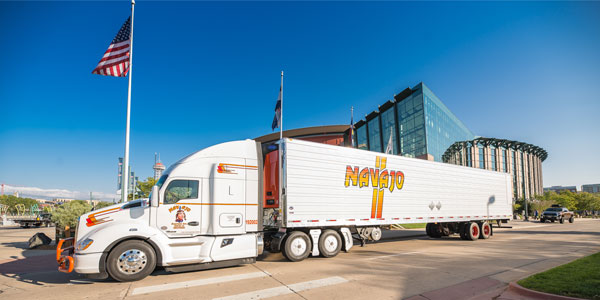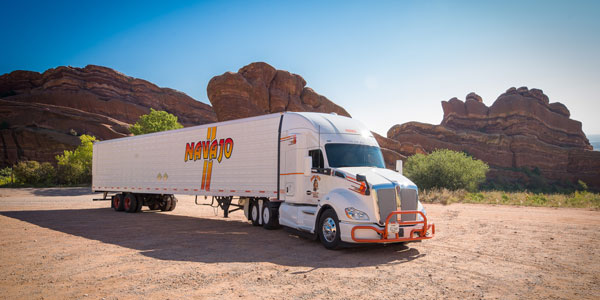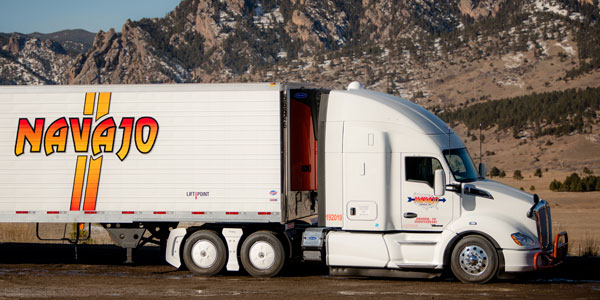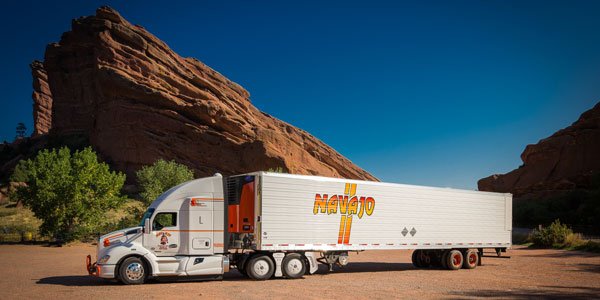“There’s everything to be gained by listening.” On one hand, it’s that simple for Don Digby Jr., president of Navajo Express. And Digby, now the third-generation head of the family-owned business, means it.
“People talk about caring about customers and drivers, but few actually do it,” says Digby. “Every day, we focus on hearing how our resources, management practices, operations and customer relationships can continue to ensure our growth and success in a highly competitive business.”
Headquartered in Denver, Navajo Express provides dedicated, dry, refrigerated, specialized and intermodal logistics services nationwide. The transportation company operates from facilities in Colorado, Utah, Arizona, Wisconsin, Arkansas and Georgia with a fleet of approximately 900 tractors and 2,250 trailers.
“There’s nothing we can’t specify or build, and our fleet has been evolving over the years,” says Digby. “For example, two years ago, we started looking at ways to reduce the weight of our tractors and trailers so we could provide maximum payload capacity. But we only specify equipment after considering the needs our customers tell us. We also regularly share our thinking and customer opportunities with OEMs.”
Today, Navajo Express’ fleet consists of several different makes and models, but the majority of the equipment consists of Kenworth tractors and utility trailers. The average age of the trucks in the fleet is 2.5 years, and the trailers are four years old.
Most of the trailers on the Navajo Express are 53 ft. refrigerated and there are 53 ft. dry vans, 57 ft. dry and refrigerated units and some 53 and 57 ft. tri-axle heavy haulage models. In addition to the 48 ft. refrigerated trucks, there are large sets of 48 and 42 ft. sets, and like the Rocky Mountain Doubles, there are 48 and 28 ft. trailers.
With its array of equipment and expertise, Navajo Express has a well-deserved reputation for providing efficient service across a wide range of market segments. At the same time, the company is known for its comprehensive driver vision that provides benefits to employees, the carrier, and its customers.


Miles, money, home – and always with respect.
“A key part of our reputation is our focus on the factors that matter to customers and drivers,” says Digby. “We are constantly working to listen to them, and we understand how every decision we make will impact transportation costs for shippers and the quality of life for our drivers, as well as their families.
“For drivers, we’ve learned that it’s about much more than just pay rates,” Digby continues. “By using our equipment, we can maximize their productivity. Through our network of facilities, we can operate as a regional operation and make the most of the time they spend in their home country.”
“Our growing, loyal business is more than just a way to meet the needs of transporters,” Digby adds. “In these operations, drivers can be home every night, or every other day in most cases.”
Digby notes that Navajo’s efforts benefit the company by reducing hiring costs. “Our goal is always to have no driver turnover, but since that’s not realistic, we focus on relationships, operating practices and equipment to facilitate a positive driver experience.
“On a weekly basis, our hiring success is up 20%,” Digby adds. “Part of the reason for this is because our recruiters are former drivers who understand what drivers need and can effectively explain how Navajo Express can be a great place to work.”
Navajo Express also works hard to provide equipment that drivers find convenient. For example, there are DriveCam systems to protect them in the event of an accident. In-cab Wi-Fi systems are currently being evaluated which Digby says is part of an effort to find creative solutions to provide drivers with the same conveniences they enjoy at home.
About 80 percent of the Navajo Express fleet is equipped with EpicVue in-cab satellite TV systems. “EpicVue is part of our overall effort to provide drivers with amenities that make them feel as comfortable on the road as they would at home,” says Digby. “It’s also been shown to help reduce hiring costs by improving driver retention when they’re considering leaving.”


do the right thing
Part of Navajo Express’s culture of driver respect is built on a strong foundation of safety. “We want to make sure that we continue to raise the safety standards, not only here in Navajo, but industry-wide as well, because we all have to do the right thing,” Digby says. “Safety is a core value that is part of the structure of our entire operation.”
In 2014, Navajo began equipping tractors with Bendix Wingman Advanced active cruise control, braking and collision mitigation technology. For its 2018 and 2019 trucks, it has dedicated Bendix Wingman Fusion driver assistance systems to help focus on the causes of a collision. Starting with the 2019 model year, new trucks and tractors in the fleet are also equipped with Bendix ADB22X air disc brakes.
“We have received positive feedback from our drivers about these systems because it helps them hone their habits and avoid rear-end collisions,” says Digby. “The data they generate also allows us to quickly recognize and address unsafe situations.”
“For the Navajo, the payback is lower accident rates and lower costs,” Digby says. “Based on four years of data going back to when we started using Wingman, we saw a 77% reduction in rear-end collisions.”
Navajo Express also honors driver safety achievements with monthly and annual awards, including trucks designated for million-mile safe drivers. Of the company’s 1,000 drivers, nearly 30 have 1 million miles and two drivers have driven safely for Navajo more than three million miles.


Reduce CPM
Navajo Express drivers also support the company’s four stores, 60 technicians, maintenance services provided by Ryder and Penske in remote locations and a relationship with MHC Kenworth dealers for warranty work. “This combination gives us flexibility and has helped reduce our maintenance costs from 16 cents to less than ten cents per mile,” says Digby.
“Having alternatives also means we don’t have to take drivers off the tracks and use available service hours for maintenance,” Digby adds. “At the same time, we use mapping solutions, Blue Tree Systems tracking on tractors and ORBCOMM tracking on trailers, and Trimble’s NetWise load optimization software to assess haulage needs, capacity, waiting time and other factors so we can provide improved service and save costs.”
For Digby, it’s that simple: Success at Navajo Express is measured by customer and driver satisfaction. He points out that the company’s on-time delivery record of 98.5% speaks for itself, all driven by the support of a hardworking team that delivers creative and reliable services and solutions.





